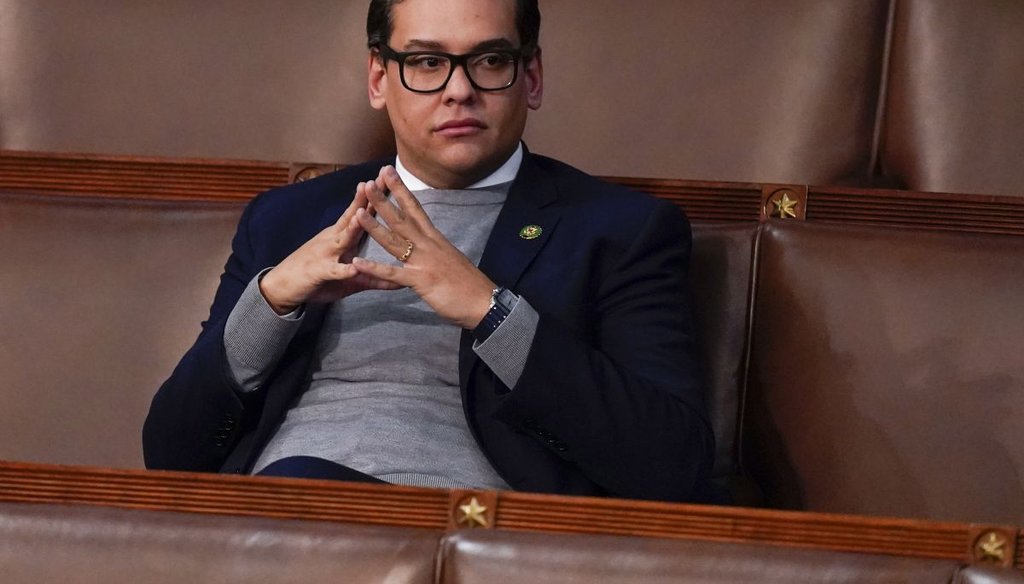Stand up for the facts!
Our only agenda is to publish the truth so you can be an informed participant in democracy.
We need your help.
I would like to contribute

Rep. George Santos, R-N.Y., waits for the start of a session in the House chamber on Jan. 6, 2023. (AP)
The indictment and arrest of Rep. George Santos, R-N.Y., on May 10 cast a pall over his political future. But any direct consequences on his service in the House are unlikely to emerge anytime soon.
In December, shortly after Santos unexpectedly won a seat representing parts of Queens and Long Island, news reports in The New York Times and elsewhere detailed a wide array of dubious statements he had made about his background.
Santos was seated in the House in January, but within months, federal prosecutors sought and received a grand jury indictment on seven counts of wire fraud, three counts of money laundering, one count of theft of public funds and two counts of lying on congressional financial forms.
Santos pleaded not guilty, and he remains a voting member of Congress. As he awaits trial, experts say Santos can mostly continue his duties.
Here’s a rundown of what could be next for Santos.
Sign up for PolitiFact texts
Unless and until his House peers expel him, Santos can serve the rest of his two-year term and even run for reelection in 2024, something he’s promised to do.
"There is a long history of members of Congress retaining their seats following an indictment and while they defend themselves," said Rich Cohen, chief author of "The Almanac of American Politics" and a longtime House beat reporter.
The list of House members in the past two decades who have continued to serve in office after being indicted includes Democrats Chaka Fattah (Pennsylvania) and William Jefferson (Louisiana) and Republicans Michael Grimm (New York), Rick Renzi (Arizona) and Jeff Fortenberry (Nebraska).
One reason indicted House members tend to stay in office rather than resign: A resignation can serve as a useful bargaining chip in negotiating a plea deal with prosecutors. Also, resigning would mean forgoing a congressional salary, which many lawmakers in that position cannot afford to do.
It can take months or more than a year for indicted House members to see their cases decided at trial, so it’s not unusual to see lawmakers continuing to serve for long stretches under indictment.
When House members are indicted, the main consequences are up to their party, not the House’s governing rules. Santos is not expected to see significant change for now.
First, Santos can’t lose what he doesn’t have: committee assignments. The most important perk Santos could lose after an indictment would be a committee membership. But he was blocked from receiving committee assignments because of the controversies accompanying his arrival.
Second, the House Republicans’ slim five-vote majority makes it unlikely that GOP leaders will punish Santos. They need his vote and don’t want to alienate him so much that he stops cooperating.
House Speaker Kevin McCarthy, R-Calif., has said that the party would let Santos’ investigation play out in court.
"I think in America, you’re innocent till proven guilty," McCarthy said after Santos’ arrest, adding to a CNN reporter, "He will go through his time in trial and let’s find out how the outcome is."
Steven Smith, a political scientist at Washington University in St. Louis, said, "The fact that it is likely that Santos would be replaced by a Democrat if a special election is held surely encourages House Republicans to allow the investigation to ‘play out.’ Until then, Speaker McCarthy can count on Santos's vote."
This reality makes it unlikely that the House Republican Conference could expel Santos as one of its own members, a move that would require a majority vote of the conference. .
A conviction alone would not dislodge Santos from the House.
According to House Rules, members convicted of a crime that carries a penalty of two or more years in prison are urged not to vote in committee or on the House floor.
However, this rule "is phrased in advisory, not mandatory" language, the nonpartisan Congressional Research Service has written. That’s because the House "has raised issues concerning its authority to mandatorily suspend a member from voting by a process less than an expulsion."
Smith said, "Conviction does not remove him from office. He must resign or be expelled."
Expulsion requires a two-thirds vote of the full House, meaning that a significant number of members from the lawmaker’s own party must vote to expel.
This high bar for expulsion has made it a far less common outcome than resignation following a lawmaker’s conviction.
In House history, only five members have been expelled, according to the Congressional Research Service. The most recent instance was in 2002, when Rep. James Traficant, a renegade Democrat from Ohio, was convicted of 10 corruption-related charges. Only one other House member has been expelled since the Civil War era: Rep. Ozzie Myers, D-Pa., who was convicted of bribery in 1980.
Former Rep. Jim Traficant in Boardman, Ohio, in 2010. (AP)
It has happened before.
Traficant was convicted April 11, 2002, and expelled from the House July 24, 2002. He entered prison Aug. 6, 2002, but continued running for his old office. He was defeated in November 2002.
Had Traficant won, he likely would have been allowed to serve unless the House expelled him anew. However, it would have been a pyrrhic victory, since Traficant would have been unlikely to receive remote voting privileges, said Donald Wolfensberger, a congressional scholar at the Woodrow Wilson International Center for Scholars and a former staff director of the House Rules Committee.
Lacking a vote or other perks of office, he would have been a member in name only.
Our Sources
Rules of the House of Representatives, 2023 version
Congressional Research Service, "Expulsion of members of Congress: legal authority and historical practice," Jan. 11, 2018
Congressional Research Service, "Status of a member of the House who has been indicted for or convicted of a felony," May 8, 2014
The Washington Post, "Rep. George Santos pleads not guilty to 13 counts of financial crimes," May 10, 2023
The Washington Post, "More than two dozen members of Congress have been indicted since 1980," July 29, 2015
The New York Times, "Who is Rep.-Elect George Santos? His résumé may be largely fiction," Dec. 19, 2022
CNN, "Santos announces 2024 reelection campaign for New York congressional seat," April 17, 2023
Huffpost, "Kevin McCarthy mocked for 'spineless' response to George Santos indictment," May 10, 2023
PolitiFact, "George Santos has been arrested. Here’s a recap of his alleged falsehoods," May 10, 2023
PolitiFact, "How a House speaker could kick some lawmakers off committees," Dec. 19, 2022
Email interview with Donald Wolfensberger, congressional scholar at the Woodrow Wilson International Center for Scholars, May 10, 2023
Email interview with Rich Cohen, chief author of the Almanac of American Politics, May 10, 2023
Email interview with Steven Smith, political scientist at Washington University in St. Louis, May 10, 2023









































